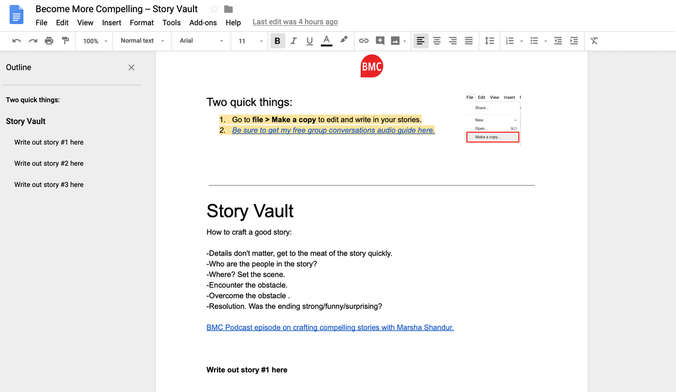You feel it...the death of your conversation.
"Some get the crash cart!!!"
You're standing there, it feels like hours since you've spoken. The ice in your drink slowly melts.
We've all been there, wondering how to keep a conversation going when:
- Making small talk with a co-worker before the Zoom meeting starts.
- Meeting a new person at a backyard BBQ.
- Sitting next to an acquaintance at happy hour.
When we can keep that conversation going, we can make new friends, better job opportunities, and become more successful.
So how do we do it?
Let's dive in!
Here are 9 ways to keep a conversation going & destroy awkward pauses forever:
1: Be Socially BOLD!
One of the most important people skills you can build is the skill of being socially bold.
In conversations, bold people bring up new topics confidently, start new conversations without hesitation, and second guess themselves less.
The more you practice being bold, the greater shift you’ll notice in your mindset.
It’s a virtuous cycle, a confidence flywheel that spins faster and faster the more you practice.
2: Let Go Of Having The "Perfect" Thing To Say
Many of my private coaching clients try to edit themselves too much in conversation when we first start working together.
This self-editing leads to too much self-monitoring.
When we're in our own heads, it's easy to overthink everything.
Not a good way to level up our conversational skills.
Two things to let go of to have smoother conversations and less self-editing:
Let go of having the perfect thing to say. If you find yourself falling into the "perfection trap", realize that saying something imperfect is 100x better than keeping that perfect thing to yourself and not saying anything.
Let go of worrying that the other person won't like what you bring up. You can't control how the other person might react. You might be surprised to learn that they love that weird thing as much as you do.
3: Prepare Something To Talk About
Many people who struggle with feeling boring or their mind going blank and conversations fizzling out simply haven't taken the time to prep.
Like Gordon Ramsey wouldn't wander into Whole Foods without an ingredient list, you shouldn't go out and "wing it" with every conversation.
Here are two things you can "prep" in advance of that dinner, meeting, or happy hour so you'll have something to talk about:
Craft a "quick summary" of your day or week.
I used to be caught flat-footed when someone would ask me "What have you been up to lately?"
"Not much." Would be my default response.
It can't get much less compelling than that.
Now, I take 2 minutes before a Zoom meeting or social event and I ask myself:
"What is one interesting thing I've been doing lately?"
When someone asks me what I've been up to, I have an interesting topic to bring up right away that's much better than: "I've just been working..."
Note: If you haven't been doing anything new or interesting, it may be time to shake up your routine a little:
Google "[your city] [current month] events." and get out there and make some memories!
4. Have Three Good Stories Ready
Y'know that one guy who starts telling a story and then 15 soul-crushing minutes later they finally figure out if it took place in June or July of 2011.
When we craft stories, we need them to NOT SUCK.
That means getting to the meat of the story and leaving out mundane details that make your listeners want to stab themselves in the ear with the closest fork.
When you see Will Smith on Jimmy Fallon, he seems so effortless, so natural, so polished.
His secret?
He's told that exact story dozens of times, slowly refining it until it's completely dialed in:
- Most details don't matter
- Who are the people in the story?
- Where? Set the scene
- Encounter the obstacle
- Overcome the obstacle
- Resolution
Here's a quick story from Iceland from 2018:
My wife and I set out one morning to drive to a famous waterfall in Iceland called "Gullfoss".
We got in the car and set out. I checked all the gauges in the car, I saw that the rental place had only given us 3/4 of a tank.
No big deal, I thought.
One the drive, we were blown away by the landscape. It looked like something out of a movie. The emptiness was immense.
As we're driving along, I realized that the gas gauge in our car was the only gauge going from right to left. The rental place had actually left us with 1/4 of a tank, not 3/4.
We'd been driving for a while, and Iceland isn't known for having gas stations every few miles.
We pulled over and called the rental place while frantically spelling out Icelandic roads that we're near to see if there's a gas station nearby.
They told us about a gas station about a half hour away. It wasn't on any map.
At this point, our fuel light was on and we have to keep driving further into inland Iceland.
30 white-knuckled minutes later we roll into the gas station on fumes.
We barely made it.
Notice how details were only used to paint a picture of the scene or the experience?
I didn't waste time telling you exactly how many miles we'd driven, or even what type of car we were in.
Keep it to the point and relevant.
For more on storytelling, watch as I break down a story by Bill Hader:
Action step: Think of three stories you could develop and keep in your story vault.
Write out each story, as I did with my Iceland gas story.

Use this Google Doc template I created for you. Just go to File > Make a Copy to edit your own version!
The next time you're out, try out that story and gauge the reactions you're getting.
• Do people's eye's glaze over at certain parts?
• Do people howl with laughter at other parts?
Just like Will Smith, get your stories dialed in and you can use them for years to come.
When you have those clear, polished stories, it makes it easy for the other person to process, listen and respond.
Speaking of listening...
5. Listen & Respond Like A Pro
One of my favorite interview shows is Off Camera with Sam Jones. Recently, he had Robert Downey Jr. on his show.
And it got me thinking about the Talk Show Host mindset.
Good talk show hosts like Sam:
- Try to make their guests look good.
- Are curious about their guests.
- Listen well.
- Ask great questions.
- Make insightful observations.
When we approach that conversation with the Talk Show Host Mindset, our focus isn't on our internal state, our thoughts, our feelings, etc.
Our focus is on the other person. And showing that kind of presence is increasingly rare...especially in the age of smartphones.
Most people spring-load their response, they know what they'll respond with before the other person is done talking.
Big mistake. If you do this, you're telegraphing "I'm not listening to you."
Action step: Next time you're in a conversation, adopt the talk show host mindset by being curious and interested in the other person.
6. Think Around The Topic With The Spokes Method
I've written about the Spokes method before.
Simply put, SPOKES allows you to think around the topic to keep the conversation going.
Imagine a bicycle wheel.
In the center of the wheel is the hub.
The hub is the current conversational topic.
Example topic: Cooking.
Radiating out from that hub are spokes. Think of the spokes as topics that relate to the topic at hand.
For cooking we have quite a few to play with:
- Favorite dishes to make
- Old family recipes
- Cooking gear
- A recent meal I tried to make that didn't work
- Favorite cooking shows
So we don’t have that one topic to play with. We have five. Plenty of options.
Let’s kick it up a notch with a harder topic.
Say you’re at happy hour and someone mentions that they’re a mechanical engineer.
And let’s say you’re like me and you don’t know much about mechanical engineering.
What are your spokes?
Play along while reading this: come up with three possible spokes!
I’ll wait...
--
--
--
--
So, what did you come up with?
Here are mine:
- "What got you into engineering?"
- "Working on anything exciting right now?"
- "Have you ever seen an object that made you stop because it was engineered so well?"
- "As a kid, I bet you liked taking things apart."
- "It's great to be so excited about what you do."
Notice how our focus shifts from the topic to focus on the person.
(Also note how some spokes are observations, not questions. This helps you avoid falling into the interrogation trap.)
Even if you don't know anything about mechanical engineering, you can still have a great conversation.
7. Have Good Conversation Questions Ready So You Can "Go Deep"
People always ask me: How can I go from small talk to a deeper conversation?
One way to do this is using what I call "Dig questions"
These questions are designed to be open-ended and work well after they've said something interesting. They won't be able to answer with a simple "Yes" or "No".
Here are five "Dig Questions" to steal:
- "Tell me more about x."
- "Why x?"
- "What was that moment like for you?"
- "When did you first realize x?"
- "Knowing what you know now, would you have still done x?"
With these questions, we're transitioning to deeper conversational levels.
We're asking questions designed to let us know more about who that person is, and what it's like to be them.
With Spokes and the Talk Show Host Mindset, you are shining the conversational spotlight on the other person.
People love that.
8. How To Keep A Conversation Going With "Same Here!" Moments
People love discovering they have something in common with others.
When they do, it communicates that they belong to the same tribe.
Sometimes, those connections are obvious (same company, same alma mater or same conference).
Sometimes, they’re teased out through conversation.
When you discover that you both are into that same obscure band, watch their face light up when you tell them.
Action step: When those "Same here!" pop up, don't let them pass like two ships in the night. Call them out!
The more shared connections you have with someone, the more likely you’ll hit it off.
9. Avoid Awkward Pauses By Expecting Them
Finally, realize that pauses WILL happen. They do in every conversation.
They only become awkward pauses if you think of them as them "awkward".
Sometimes, pauses can be necessary.
After I ask a question on my podcast, there's a very real temptation to fill the "vacuum" of silence that happens after asking a question.
It's fine to give the other person a second to formulate a response.
Often this leads to a better conversation because I gave them the space to think.
If there's a conversational lull, and you'd like to transition out of it, try using the following script:
"Oh, I just remembered this..."
You can use this to transition to another story from your story vault.
Or you can say "Tell me more about x." where you bring up something they've talked about, like a hobby, trip or job.
The big thing we want to avoid when pauses happen is that inner monologue of "Oh no, this is another awkward pause, what should I talk about?!"
With these 8 tips, you'll know how to keep a conversation going, and tell great stories whenever you want!
Summary: How To Keep A Conversation Going Exercises
- Be socially bold!
- Let go of having the "perfect" thing to say
- Prepare something to talk about
- Have three good stories ready
- Listen & respond like a pro (Be curious and interested in the other person!)
- Think around the topic with the spokes method
- Have good conversation questions ready so you can "go deep"
- Keep a conversation going with "same here!" moments
- Avoid awkward pauses by expecting them
3 ways I can help you level up your communication skills:
1. Private Coaching: I’m the secret weapon top Performers at Google, Netflix, and the US Army trust for people skills coaching. Imagine what I can do for you.
2. Social Accelerator: Social Accelerator is my proven self-paced + group coaching system for turning social awkwardness into confidence, overthinking into action, and hesitation into meaningful connections.
3. My group convos audio guide. Join over 5,000 overthinkers who have supercharged their group conversation skills using tested strategies in my 56-minute audio training.

I'm Jeff Callahan
I make it nearly impossible for overthinkers to fail at improving their people skills. (I've helped hundreds of people over the last 10 years)
Want to never run out of things to say in conversation again so you connect with more people and make new friends?
Want to speak up more in important meetings at work so you get promoted faster and have an awesome career?
Want to develop unshakeable social confidence and competence so you can walk into any room and feel like you belong there?
As your coach, I'll help you move forward faster.



















